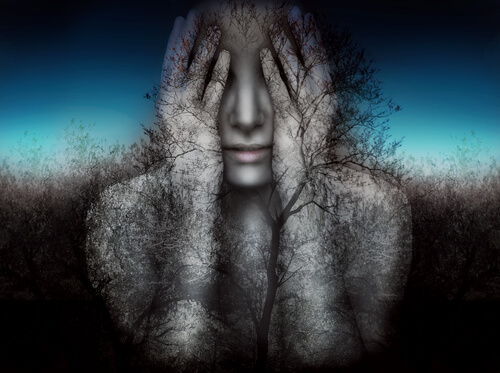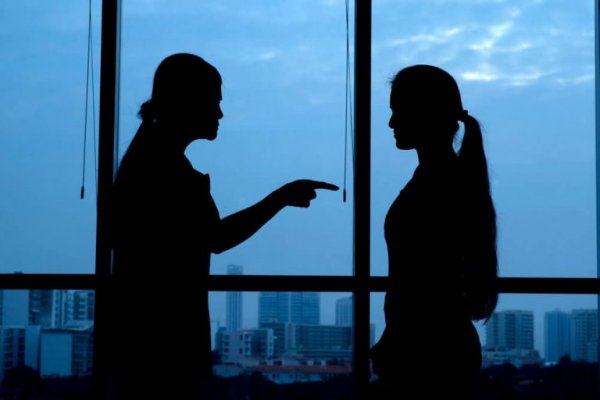Recognizing Our Mistakes Means We Can Learn From Them

Confucious said, “If you make a mistake and do not correct it, this is called a mistake.” If we follow that logic, is it true that denying our mistakes means we don’t learn anything from them? In other words, is denying a mistake the first obstacle to fixing what we messed up in the first place?
At the end of the day, the famous line “It wasn’t me,” entails an obvious denial of responsibility. When you use it, aren’t you really just trying to justify your mistake? And then by justifying it, isn’t that just a way to ignore what you did wrong? So, in the end, we are talking about denial.
“I like my mistakes. I don’t want to give up the delicious freedom to make mistakes.”
-Charlie Chaplin-
What happens when you deny a mistake?
When you don’t admit your mistakes, what you are usually trying to do is put some distance between you and what happened, and the consequences.
However, that same distance makes it harder for you to learn from what happened. It pushes away the possibility of reviewing the process and identifying the errors.

On the other hand, that same distance can give you a little bit of relief at first. That relief can quickly turn into anxiety if you have to face the same challenge again. Then you will kick yourself for not correcting your mistakes the first time around.
For example, suppose you work in a company that has to communicate with people in other countries who speak different languages. If you, as the one in charge, don’t assume that there has to be someone (or you) willing to make the calls, it is unlikely you will take responsibility. As a result, the communication probably won’t happen the first time, and it will be difficult to achieve it on subsequent occasions.
Let’s say you refuse to explore your failures or recognize them. In addition to making things impossible in the future, this attitude is a barrier to self-knowledge.
If you deny the process, you also deny any responsibility for things you did right. As a result, you won’t be aware of your abilities, or be able to make the most of them.
Ways that denial prevents you learning from your mistakes
At this point, it is worth looking at a study from a team of researchers at the University of California and New York. The study showed that the fact that you don’t accept your own mistakes is related to your personality. It actually diminishes your potential for growth.
To reach these conclusions, thousands of profiles were analyzed. In them, the researchers tried to identify the types of dominant personalities according to how people reacted to making mistakes.
We have some interesting results from the study. One result was that researchers could categorize an estimated 70% of the population into three large groups according to their reactions to mistakes.
Someone else is to blame
Children say “it wasn’t me!” all the time. It turns out that many adults say it as well. In other words, when these kinds of people make a mistake, they duck their responsibility and blame it on a second person.

That is to say that when they blame someone else for their mistakes, in a certain way they are denying them. They aren’t sufficiently mature to recognize them or to try and get to know themselves better. They tend to play the victim. They are incapable of accepting guilt and can’t make a constructive assessment of what happened.
Nothing happened here
People who can’t see their mistakes at all make up the other group. In other words, as much as you show them evidence, they are incapable of seeing that they should have any of the blame.
This group of people will completely deny that they’ve done anything wrong. They aren’t directly able to deal with blame because they don’t see it. For them it’s impossible to learn from something that doesn’t exist or that they aren’t willing to recognize.
Taking more responsibility than you need to
Learning from our mistakes means admitting that we have erred. It’s important to be able to say things like “it was my fault.” Fortunately, a large part of the population can recognize when they are wrong. They are willing to correct, repair, put things right, and improve.
Nevertheless, we have to be careful. Sometimes we encounter people who go to the other extreme. They take responsibility not only for their actions but also for everyone else’s. Consequently, they can potentially expend a lot of resources to make amends, and disproportionately punish themselves for what happened.
“Experience is the name everyone gives to their mistakes.”
-Oscar Wilde-f

That being said, to err is human. But learning from our mistakes, and not denying them, that is also human. In fact, it is a great opportunity to become a better person and to get to know ourselves. It doesn’t mean that you should make mistakes all day long, but if the opportunity comes up, don’t waste it by being in denial.
Confucious said, “If you make a mistake and do not correct it, this is called a mistake.” If we follow that logic, is it true that denying our mistakes means we don’t learn anything from them? In other words, is denying a mistake the first obstacle to fixing what we messed up in the first place?
At the end of the day, the famous line “It wasn’t me,” entails an obvious denial of responsibility. When you use it, aren’t you really just trying to justify your mistake? And then by justifying it, isn’t that just a way to ignore what you did wrong? So, in the end, we are talking about denial.
“I like my mistakes. I don’t want to give up the delicious freedom to make mistakes.”
-Charlie Chaplin-
What happens when you deny a mistake?
When you don’t admit your mistakes, what you are usually trying to do is put some distance between you and what happened, and the consequences.
However, that same distance makes it harder for you to learn from what happened. It pushes away the possibility of reviewing the process and identifying the errors.

On the other hand, that same distance can give you a little bit of relief at first. That relief can quickly turn into anxiety if you have to face the same challenge again. Then you will kick yourself for not correcting your mistakes the first time around.
For example, suppose you work in a company that has to communicate with people in other countries who speak different languages. If you, as the one in charge, don’t assume that there has to be someone (or you) willing to make the calls, it is unlikely you will take responsibility. As a result, the communication probably won’t happen the first time, and it will be difficult to achieve it on subsequent occasions.
Let’s say you refuse to explore your failures or recognize them. In addition to making things impossible in the future, this attitude is a barrier to self-knowledge.
If you deny the process, you also deny any responsibility for things you did right. As a result, you won’t be aware of your abilities, or be able to make the most of them.
Ways that denial prevents you learning from your mistakes
At this point, it is worth looking at a study from a team of researchers at the University of California and New York. The study showed that the fact that you don’t accept your own mistakes is related to your personality. It actually diminishes your potential for growth.
To reach these conclusions, thousands of profiles were analyzed. In them, the researchers tried to identify the types of dominant personalities according to how people reacted to making mistakes.
We have some interesting results from the study. One result was that researchers could categorize an estimated 70% of the population into three large groups according to their reactions to mistakes.
Someone else is to blame
Children say “it wasn’t me!” all the time. It turns out that many adults say it as well. In other words, when these kinds of people make a mistake, they duck their responsibility and blame it on a second person.

That is to say that when they blame someone else for their mistakes, in a certain way they are denying them. They aren’t sufficiently mature to recognize them or to try and get to know themselves better. They tend to play the victim. They are incapable of accepting guilt and can’t make a constructive assessment of what happened.
Nothing happened here
People who can’t see their mistakes at all make up the other group. In other words, as much as you show them evidence, they are incapable of seeing that they should have any of the blame.
This group of people will completely deny that they’ve done anything wrong. They aren’t directly able to deal with blame because they don’t see it. For them it’s impossible to learn from something that doesn’t exist or that they aren’t willing to recognize.
Taking more responsibility than you need to
Learning from our mistakes means admitting that we have erred. It’s important to be able to say things like “it was my fault.” Fortunately, a large part of the population can recognize when they are wrong. They are willing to correct, repair, put things right, and improve.
Nevertheless, we have to be careful. Sometimes we encounter people who go to the other extreme. They take responsibility not only for their actions but also for everyone else’s. Consequently, they can potentially expend a lot of resources to make amends, and disproportionately punish themselves for what happened.
“Experience is the name everyone gives to their mistakes.”
-Oscar Wilde-f

That being said, to err is human. But learning from our mistakes, and not denying them, that is also human. In fact, it is a great opportunity to become a better person and to get to know ourselves. It doesn’t mean that you should make mistakes all day long, but if the opportunity comes up, don’t waste it by being in denial.
This text is provided for informational purposes only and does not replace consultation with a professional. If in doubt, consult your specialist.







